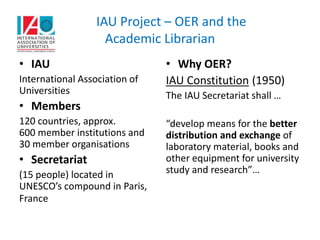International Association of Universities OER Online Mini Seminar presentation by Isabelle Turmaine, IAU
- 1. IAU Project ŌĆō OER and the Academic Librarian ŌĆó IAU International Association of Universities ŌĆó Members 120 countries, approx. 600 member institutions and 30 member organisations ŌĆó Secretariat (15 people) located in UNESCOŌĆÖs compound in Paris, France ŌĆó Why OER? IAU Constitution (1950) The IAU Secretariat shall ŌĆ” ŌĆ£develop means for the better distribution and exchange of laboratory material, books and other equipment for university study and researchŌĆØŌĆ”
- 2. IAU Project ŌĆō OER and the Academic Librarian OER are: ŌĆ£Digitized as well as non- digitized teaching and learning materials either openly released or released in the public domain that can be used and reused by all, everywhere" (source: UNESCO) ŌĆó Why OER (2)? IAU Statement Universities and ICTs (2004): ŌĆ” IAU will pursue its efforts to act as a platform for information sharing in regard to the use of ICTs in higher education, stimulating exchange of expertise and disseminating examples of good practices such as the Open Educational ResourcesŌĆ”
- 3. IAU Project ŌĆō OER and the Academic Librarian ŌĆó Why academic librarians? One of the first constituencies to support the wider open access movement They play a central role in higher education institutions Are for the IAU the best placed and trained to advocate for and promote the use, creation, and dissemination of OER. ŌĆó Accra (Ghana) Seminar To validate the concept for the need of a specific Training and Support Programme for Academic Librarians on OER Use, Reuse, and Production. 20 librarians from 10 African anglophone countries With support of UNESCO and African Association of Universities
- 4. IAU Project ŌĆō OER and the Academic Librarian Results: ŌĆó ParticipantsŌĆÖ knowledge on OER was updated ŌĆó They confirmed their possible role in the promotion of OER at the university and beyond ŌĆó They validated the project purposes and format (promotion and multiplication of OER through capacity building and support) Unfortunately, up to now, the IAU has not been able to develop the project But IAU new strategy which is being drafted comprises an item on ICTs that could include OER
- 5. IAU Project ŌĆō OER and the Academic Librarian So, the purpose of this online discussion is : 1. To get information on what has changed concerning OER at libraries since Accra In your library? Do you have OER in your catalogue? Do you often search for OER? At your university? Is your university producing OER? Is the library involved in the production / dissemination of local OER? Do you have an OER policy? More generally Has your institution moved from OER to MOOCs? Is reaching people with disabilities part of OER development? 2. To get your viewpoint on what should be our next move
- 6. Mary ARKORFUL Ghana Head Librarian, Kofi Annan International Peacekeeping Training Centre (KAPTC) Gifty BOAKYE Ghana Deputy Librarian, University of Ghana Plaxedes CHAITEZVI Zimbabwe Sub-Librarian, WomenŌĆÖs University in Africa Mac-Anthony COBBLAH Ghana University Librarian, Methodist University Library Clement ENTSUA-MENSAH Ghana Librarian, University of Cape Coast Olukemi FADEHAN Nigeria University Librarian, University of Lagos Amina KABUDI Tanzania Director, University Library, University of Dar es Salaam Richard LAMPTEY Ghana Head of Electronic Information, Kwame University of Science and Technology (KNUST) Ntombikayise Nomsa MATHABELA Swaziland Assistant Librarian, University of Swaziland Buhle MBAMBO-THATA South Africa Executive Director, Library Services, University of South Africa Elijah MENSAH Ghana University Librarian , University of Professional Studies Kaelo MOLEBATSI Botswana Deputy Director, Resources Management, University of Botswana Balungile Brightness MOLEME South Africa Subject Librarian, University of KwaZulu Natal Matseliso MOSHOESHOE- CHADZINGWA Lesotho University Librarian, National University of Lesotho George Gitau NJOROGE Kenya Chief University Librarian, Kenyatta University Amanda SUDIC France Librarian / Documentalist, IAU Isabelle TURMAINE France Director, Information Projects and Services, IAU






